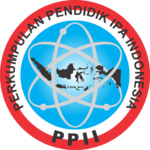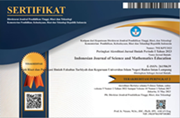An empirical analysis: The impact of project-based learning on students' mathematical reflective thinking skills and self-concept
Abstract
Keywords
Full Text:
PDFReferences
R. V. Thorat, “Mathematics in data science and artificial intelligence,” Int. J. Adv. Res. Sci. Commun. Technol., vol. 4, no. 2, pp. 362-366, 2024, doi: 10.48175/IJARSCT-15763
C. E. Hmelo-Silver, R. G. Duncan, and C. A. Chinn, “Scaffolding and achievement in problem-based and inquiry learning: A response to Kirschner, Sweller, and Clark (2006),” Educational Psychologist, vol. 42, no. 2, pp. 99-107, 2007. doi: 10.1080/00461520701263368
Y. Ariyana, Buku pegangan pembelajaran berorientasi pada keterampilan berpikir tingkat tinggi. Jakarta: Dirjen GTK. 2018.
R. Badjeber and J. P. Purwaningrum, “Pengembangan higher order thinking skills dalam pembelajaran matematika di SMP,” Guru Tua J. Pendidik. dan Pembelajaran, vol. 1, no. 1, pp. 36-43, 2018, doi: 10.31970/gurutua.v1i1.9
H. Nindiasari, “Meningkatkan Kemampuan dan disposisi berpikir reflektif matematis serta kemandirian belajar siswa SMA melalui pembelajaran dengan pendekatan metakognitif,” Ph.D. Dissertation, Universitas Pendidikan Indonesia, Bandung, Indonesia, 2013.
A. Fuady, “Berfikir reflektif dalam pembelajaran matematika,” JIPMat, vol. 1, no. 2, pp. 104-112, 2017, doi: 10.26877/jipmat.v1i2.1236
F. King, F.J., Goodson, L. and Rohani, Higher order thinking skills. Florida: Advancement of Learning and Assessment, 2013.
A. S. Pamungkas, N. Mentari, and H. Nindiasari, “Analisis kemampuan berpikir reflektif siswa SMP berdasarkan gaya belajar,” Numer. J. Mat. dan Pendidik. Mat., vol. 2, no. 1, pp. 31-42, 2018, doi: 10.25217/numerical.v2i1.209
S. C. Choy and P. S. Oo, “Reflective thinking and teaching practices: A precursor for incorporating critical thinking into the classroom,” Int. J. Instr., vol. 5, no. 1, pp. 168-182, 2012.
S. H. Noer, “Peningkatan kemampuan berpikir Kritis, Kreatif, Reflektif (K2R) matematis siswa SMP melalui pembelajaran berbasis masalah,” Ph.D. Dissertation, Universitas Pendidikan Indonesia, Bandung, Indonesia, 2010.
R. Sihaloho and R. Zulkarnaen, “Studi kasus kemampuan berpikir reflektif matematis siswa SMA,” Pros. Semin. Nas. Mat. dan Pendidik. Mat., vol. 2, no. 1, pp. 736-741, 2019.
Ministry of Education and Culture Education Assessment Center, Hasil ujian nasional 2019. Jakarta : Kemdikbud, 2019.
U. Hasanah, A. Danaryanti, and Y. Suryaningsih, “Analisis soal ujian nasional matematika SMA tahun ajaran 2017/2018 ditinjau dari aspek berpikir tingkat tinggi,” EDU-MAT J. Pendidik. Mat., vol. 7, no. 1, 2019, doi: 10.20527/edumat.v7i1.6350
A. C. I. Syadid and S. Sutiarso, “Hubungan kemampuan berpikir reflektif matematis dengan kemampuan pemecahan masalah matematis peserta didik,” Edu Sains J. Pendidik. Sains Mat., vol. 10, no. 1, pp. 237-336, 2022, doi: 10.23971/eds.v10i1.2823
M. Triana, “Pengembangan lembar kerja peserta didik berbasis inkuiri untuk meningkatkan kemampuan berpikir kreatif matematis dan self-concept siswa,” Ph.D. Dissertation, Universitas Lampung, Lampung, Indonesia, 2017.
A. R. & Zaki, M, “Analisis kemampuan berpikir reflektif matematis mahasiswa melalui bahan ajar berbasis proyek pada materi dimensi tiga,” J. Dimens. Mat., vol. 3, no. 1, pp. 172-181, 2020, doi: 10.33059/jdm.v3i01.2454
P. Guo, N. Saab, L. S. Post, and W. Admiraal, “A review of project-based learning in higher education: Student outcomes and measures,” Int. J. Educ. Res., vol. 102, no. 1, pp. 1-13, 2020, doi: 10.1016/j.ijer.2020.101586
I. A. K. Sastrika, I. W. Sadia, and dan I. W. Muderawan, “Pengaruh model pembelajaran berbasis proyek terhadap pemahaman konsep kimia dan keterampilan berpikir kritis,” J. Progr. Pascasarj. Univ. Pendidik. Ganesha Progr. Stud. IPA, vol. 3, no. 2, pp. 1-10, 2013.
Z. Rohmah, M. Ikhsan, and S. Guntur, “Project based learning on mathematics learning in Indonesia: A systematic literature review,” PATTAYA International Conference on “Economics, Education, Humanities & Social Sciences, Thailand, 2022, pp. 8-15.
A. W. Asmi, F. Rahmat, and M. Adnan, “The effect of project-based learning on students’ mathematics learning in Indonesia: A systematic literature review,” Int. J. Educ. Inf. Technol. Others, vol. 5, no. 4, pp. 311–333, 2022.
L. Zhang and Y. Ma, “A study of the impact of project-based learning on student learning effects: A meta-analysis study,” Frontiers in Psychology, vol. 14, no. 1, pp. 1-14, 2023. doi: 10.3389/fpsyg.2023.1202728
A. L. Luchang and N. B. Mohamad Nasri, “Project-Based Learning (PBL) in enhancing students’ Higher-Order Thinking Skills (HOTS): Systematic literature review,” Int. J. Acad. Res. Progress. Educ. Dev., vol. 12, no. 4, pp. 1651-1679, 2023, doi: 10.6007/IJARPED/v12-i4/20404
Y. Yunita, D. Juandi, Y. S. Kusumah, and S. Suhendra, “The effectiveness of the Project-Based Learning (PjBL) model in students’ mathematical ability: A systematic literature review,” J. Phys. Conf. Ser., vol. 1882, no. 1, pp. 1-7, 2021, doi: 10.1088/1742-6596/1882/1/012080
L. Wijnia, G. Noordzij, L. R. Arends, R. M. J. P. Rikers, and S. M. M. Loyens, “The effects of problem-based, project-based, and case-based learning on students’ motivation: A meta-analysis,” Educ. Psychol. Rev., vol. 36, no. 1, pp. 28-29, 2024, doi: 10.1007/s10648-024-09864-3
E. Kartika and S. H. Noer, “Collaborative inquiry learning to improve students’ mathematical reflective thinking ability,” In: 3rd Asian Education Symposium (AES 2018), vol. 253, no. 1, pp. 103-107, 2019. doi: 10.2991/aes-18.2019.25
M. K. Listyotami, S. H. Noer, and E. Y. Haenilah, “Discovery learning to develop student reflective thinking ability and self-efficacy,” Al-Jabar J. Pendidik. Mat., vol. 9, no. 1, pp. 73-84, 2018, doi: 10.24042/ajpm.v9i1.2839
S. H. Noer, P. Gunowibowo, and M. Triana, “Development of guided discovery learning to improve students reflective thinking ability and self learning,” in Journal of Physics: Conference Series, vol. 1581, no. 1, 2020, pp. 1-8, doi: 10.1088/1742-6596/1581/1/012041
I. F. Jayanto, S. H. Noer, and C. Caswita, “Development of guided discovery learning to improve reflective thinking,” Int. J. Trends Math. Educ. Res., vol. 2, no. 2, 2019, pp. 106-111, doi: 10.33122/ijtmer.v2i2.116
T. Suprianto, S. H. Noer, and U. Rosidin, “Pengembangan model pembelajaran group investigation berbantuan soal open ended untuk meningkatkan kemampuan berpikir reflektif matematis,” AKSIOMA J. Progr. Stud. Pendidik. Mat., vol. 9, no. 1, pp. 72-85, 2020, doi: 10.24127/ajpm.v9i1.2583
S. H. Noer, P. Gunowibowo, and M. Triana, “Improving students’ reflective thinking skills and self-efficacy through scientific learning,” J. Phys. Conf. Ser., vol. 1581, no. 1, 2020, pp. 1-9, doi: 10.1088/1742-6596/1581/1/012036
K. Supardi, Imam and R. Putri, Indraspuri, “Pengaruh penggunaan artikel kimia dari internet pada model pembelajaran creative problem solving terhadap hasil belajar kimia siswa SMA,” J. Inov. Pendidik. Kim., vol. 4, no. 1, pp. 575-581, 2011.
J. W. Thomas and P. D, A review of research on project-based learning. California: The Autodesk Foundation, 2000.
D. E. Novianti, “Asesmen Kompetensi Minimum (AKM) dan kaitannya dengan kemampuan pemecahan masalah matematika,” Semin. Nas. Pendidik. LPPM IKIP PGRI Bojonegoro, vol. 2, no. 1, pp. 85-91, 2021.
D. Fisher, Y. S. Kusumah, and J. A. Dahlan, “Project-based learning in mathematics: A literatur review,” in Journal of Physics: Conference Series, vol. 1657, no. 1, 2020, pp. 1-7, doi: 10.1088/1742-6596/1657/1/012032
L. P. A. Arum and P. Wijayanti, “Profil berpikir reflektif siswa smp dalam memecahkan masalah aljabar ditinjau dari perbedaan jenis kelamin,” MATHEdunesa, vol. 2, no. 6, pp. 193-202, 2017, doi: 10.15642/jrpm.2017.2.2.144-152
Z. Chairani, “Scaffolding dalam pembelajaran matematika,” Math Didact. J. Pendidik. Mat., vol. 1, no. 1, pp. 39–44, 2015, doi: 10.33654/math.v1i1.93
R. Rahmazatullaili, C. M. Zubainur, and S. Munzir, “Kemampuan berpikir kreatif dan pemecahan masalah siswa melalui penerapan model project based learning,” Beta J. Tadris Mat., vol. 10, no. 2, pp. 166–183, 2017, doi: 10.20414/betajtm.v10i2.104
R. S. S Samad, H. Hamid, and A. Afandi, “Penerapan model problem based learning untuk meningkatkan kemampuan berpikir reflektif siswa pada materi persamaan linear satu variabel,” Delta-Pi J. Mat. dan Pendidik. Mat., vol. 9, no. 2, pp. 1-12, 2020, doi: 10.33387/dpi.v9i2.2265
A. Aminullah, “Kajian penggunaan metode pembelajaran berbasis proyek (project based learning) dalam meningkatkan kemampuan berpikir kreatif matematis,” Pros. Semin. Nas. Pendidik dan Pengembang Pendidik. Indones., vol. 1, no. 1, 2018, pp. 43-51.
D. I. Hapsari, G. S. Airlanda, and Susiani, “Penerapan project based learning untuk meningkatkan motivasi belajar matematika,” J. Ris. Teknol. dan Ilmu Pendidik., vol. 2, no. 1, pp. 102–112, 2019, doi: 10.24252/auladuna.v5i2a4.2018
R. Jantiawati, “Kemampuan berpikir reflektif matematis berdasarkan penerapan strategi pemecahan masalah cubes dan star peserta didik kelas VIII pada materi bangun ruang sisi datar SMP Negeri 2 Bandar Lampung,” Und. Thesis, UIN Raden Intan Lampung, Lampung, Indonesia, 2018.
Rosmaya and S. H. Noer, “The analysis of reflective thinking ability in junior high school students,” in Journal of Physics: Conference Series, vol. 1521, no. 3, pp. 1-8, doi: 10.1088/1742-6596/1521/3/032024
I. I. Supianti, “Pemanfataan Teknologi Informasi dan Komunikasi (TIK) dalam pembelajaran matematika,” MENDIDIK J. Kaji. Pendidik. dan Pengajaran, vol. 4, no. 1, pp. 63-70, 2018, doi: 10.30653/003.201841.44
S. H. Noer, Strategi pembelajaran matematika. Yogyakarta: Matematika, 2017.
B. D. Lazić, J. B. Knežević, and S. M. Maričić, “The influence of project-based learning on student achievement in elementary mathematics education,” South African J. Educ., vol. 41, no. 3, pp. 1-10, 2021, doi: 10.15700/saje.v41n3a1909
Nirmalawati, “Pembentukan konsep diri pada siswa pendidikan dasar dalam memahami mitigasi bencana,” J. SMARTek, vol. 9, no. 1,pp. 61-69, 2011.
DOI: http://dx.doi.org/10.24042/ijsme.v7i3.21111
Refbacks
- There are currently no refbacks.
Copyright (c) 2024 Unit Riset dan Publikasi Ilmiah FTK UIN Raden Intan Lampung

This work is licensed under a Creative Commons Attribution-ShareAlike 4.0 International License.

Indonesian Journal of Science and Mathematics Education is licensed under a Creative Commons Attribution-ShareAlike 4.0 International License.




